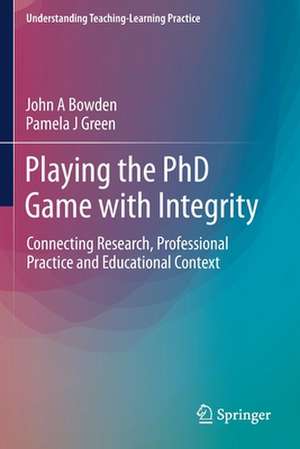Playing the PhD Game with Integrity: Connecting Research, Professional Practice and Educational Context: Understanding Teaching-Learning Practice
Autor John A Bowden, Pamela J Greenen Limba Engleză Paperback – 15 aug 2020
While the data the book employs stems from practice-led research within the Australian doctoral system, the conclusions drawn are of global relevance. Throughout the book, wherever appropriate, comparisons are made between the Australian context and other contexts, such as the doctoral systems of the United Kingdom, Europe and the United States.
| Toate formatele și edițiile | Preț | Express |
|---|---|---|
| Paperback (1) | 528.63 lei 6-8 săpt. | |
| Springer Nature Singapore – 15 aug 2020 | 528.63 lei 6-8 săpt. | |
| Hardback (1) | 704.36 lei 6-8 săpt. | |
| Springer Nature Singapore – 26 iun 2019 | 704.36 lei 6-8 săpt. |
Preț: 528.63 lei
Preț vechi: 621.92 lei
-15% Nou
Puncte Express: 793
Preț estimativ în valută:
101.15€ • 105.41$ • 83.75£
101.15€ • 105.41$ • 83.75£
Carte tipărită la comandă
Livrare economică 03-17 aprilie
Preluare comenzi: 021 569.72.76
Specificații
ISBN-13: 9789811369926
ISBN-10: 9811369925
Pagini: 300
Ilustrații: XVII, 300 p. 13 illus., 2 illus. in color.
Dimensiuni: 155 x 235 mm
Greutate: 0.45 kg
Ediția:1st ed. 2019
Editura: Springer Nature Singapore
Colecția Springer
Seria Understanding Teaching-Learning Practice
Locul publicării:Singapore, Singapore
ISBN-10: 9811369925
Pagini: 300
Ilustrații: XVII, 300 p. 13 illus., 2 illus. in color.
Dimensiuni: 155 x 235 mm
Greutate: 0.45 kg
Ediția:1st ed. 2019
Editura: Springer Nature Singapore
Colecția Springer
Seria Understanding Teaching-Learning Practice
Locul publicării:Singapore, Singapore
Cuprins
1 'Playing the PhD game' with integrity: An overview.- 2 The moral compass framework (MCE) for resolution of wicked problems in doctoral education.- 3 Moral development within the doctoral system.- 4 Connected moral capability: The missing link in doctoral education.- 5 Completion mindsets and contexts in doctoral education: Pursuing efficiency and quality with integrity.- 6 Integrity principles for the conduct of research.- 7 Decision-making with integrity in doctoral research practice.- 8 Writing with integrity.- 9 Creative team authorship: Sequential and cascading mutual catalysis.- 10 Establishing integrity in doctoral research training.- 11 Learning to use 'negotiated sense' on wicked problems beyond the PhD.
Notă biografică
John Bowden is a Professor Emeritus at RMIT University, following 12 years as a Professor of Educational Development. His contributions include (1) integration of knowledge content, generic attributes and workplace competence into a capabilities-driven curriculum design theory, and (2) establishment of a modified qualitative research approach (developmental phenomenography) that has since been adopted internationally. John was founder and first President of the Australasian Society for Computers In Learning in Tertiary Education (ASCILITE) and served as President of the Higher Education Research and Development Society of Australasia for three years.
Pam Green is an Adjunct Professor at RMIT University. For more than a decade, she was the Director of Graduate Studies at SUT. She was also responsible for the creation, from 2004 onwards, of the research student programme and supervisor training at SUT (Melbourne and Sarawak). Currently she is an educational consultant, offering research training for universities, and supervising doctoral candidates. Pam is co-founder of the Australian Qualitative Research Association. Her areas of expertise include doctoral education, research supervision, language / literacy education, qualitative research, transition and leadership.
Textul de pe ultima copertă
This book focuses on integrity throughout the PhD journey and beyond, and is organised around two main themes: (1) integrity in relation to the capabilities developed by doctoral candidates for professional practice; and (2) integrity and coherence at the PhD system level. The working methods of key participants such as PhD candidates, supervisors, university managers, government agencies and politicians are central to achieving integrity goals within PhD programmes. In this context, a number of constructs are developed that inform the practice-based elements of the book in relation to conducting doctoral research, research supervision, academic writing, and research training support systems; in particular, these include our Moral Compass Framework for professional integrity, notions of collective morality, decision-making when faced with ‘wicked’ problems, connected moral capability and our double-helix model of capability development, negotiated sense in contrast with common sense, completion mindsets and contexts, mindfulness, liminality, and mutual catalysis in joint authorship.
While the data the book employs stems from practice-led research within the Australian doctoral system, the conclusions drawn are of global relevance. Throughout the book, wherever appropriate, comparisons are made between the Australian context and other contexts, such as the doctoral systems of the United Kingdom, Europe and the United States.
Caracteristici
Provides a coherent view across research, PhD goals, candidature experiences and professional activity Contrasts an economic rationalist perspective on the topic with an holistic, humanistic view Argues for integrity as a universal attribute relevant to all situations and contexts in life





